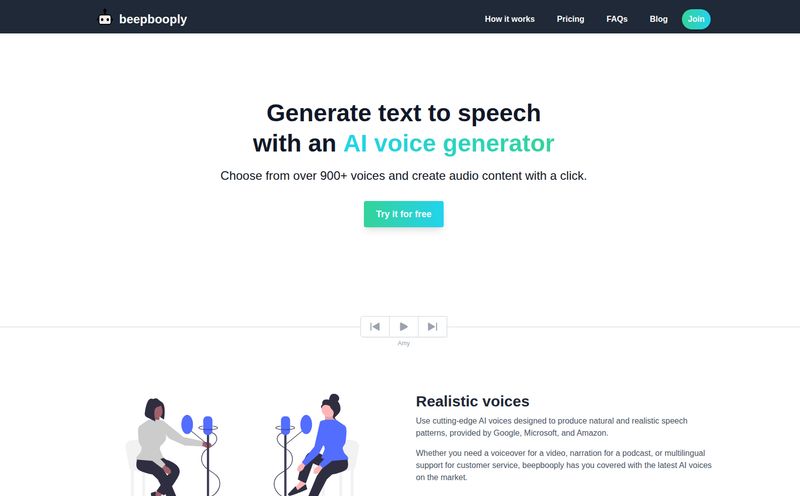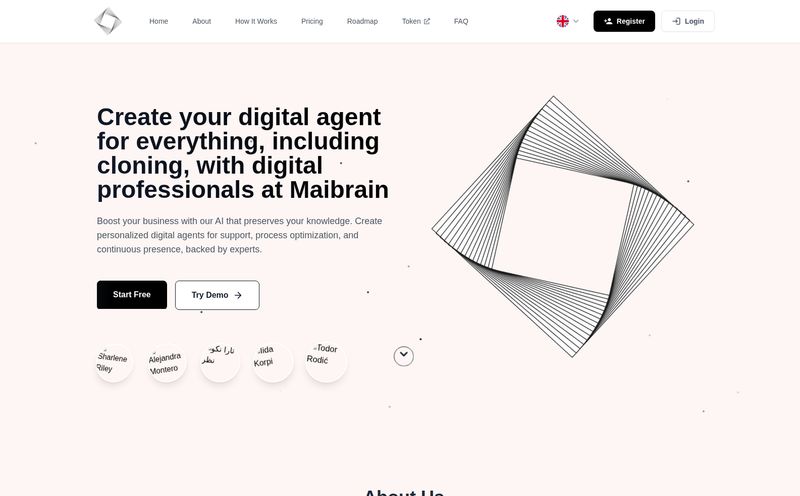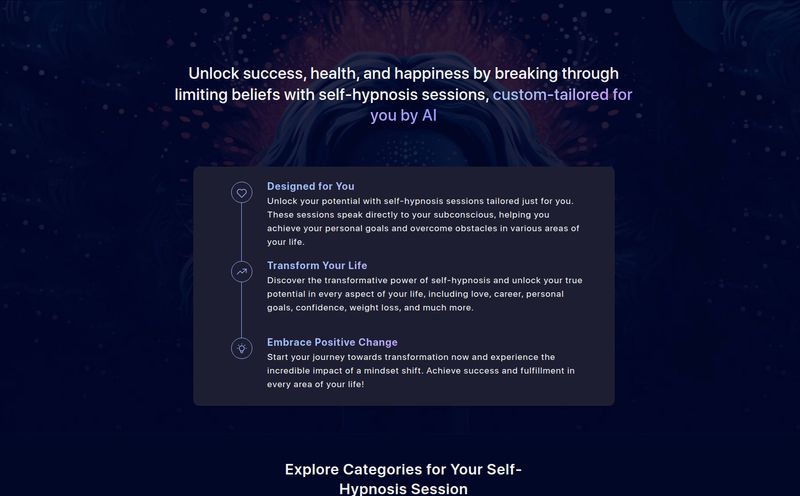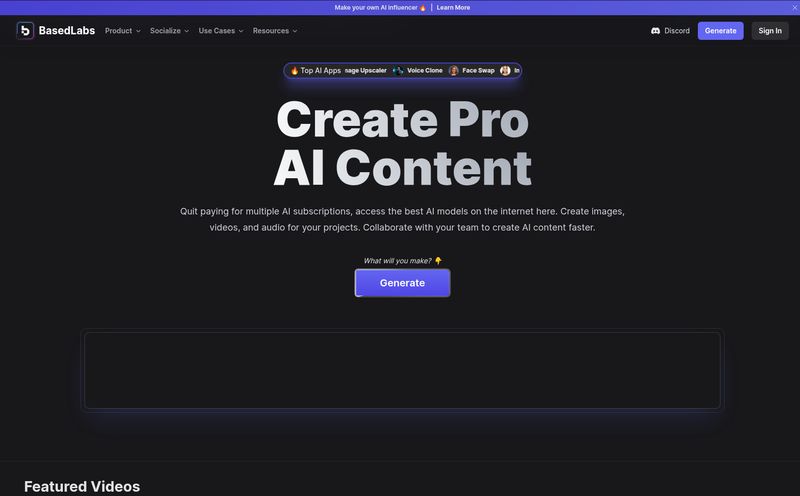I’ve spent more hours than I’d care to admit wrestling with GitHub repositories, cryptic command-line instructions, and temperamental Colab notebooks, all in the name of high-quality voice cloning. It’s a bit of a wild west out there. You find a promising new model, and the next thing you know, you're debugging Python dependencies at 2 AM, wondering where it all went wrong. We’ve all been there, right?
So when a new tool called Applio pops up on my radar with a landing page that’s basically just three words—simple, high-quality, performance—my interest is definitely piqued. It’s like a minimalist café opening up in a neighborhood full of chaotic, over-the-top fusion restaurants. Could this be it? The push-button, no-fuss voice conversion tool for the rest of us?
Let's take a look. I've been digging around, and frankly, it’s an interesting little package with a few quirks worth talking about.
So, What is Applio, Really?
At its core, Applio is a voice conversion tool built on a VITS model. Now, for those not deep in the AI voice weeds, VITS stands for Variational Inference with adversarial learning for end-to-end Text-to-Speech. All you really need to know is that it’s a type of AI architecture known for producing some seriously natural-sounding and expressive speech. It's good tech.
Applio’s entire mission, as stated on its stark, black-and-white homepage, is to wrap this powerful technology in a package that focuses on ease of use and performance. No frills, no fluff. Just a download button and links to GitHub and Discord. In a world saturated with feature-bloat, I find that kind of confidence refreshing. It’s a bold statement.

Visit Applio
But here’s the first little wrinkle I found. The homepage clearly states, “Available on Windows, Mac, & Linux.” Awesome, right? Cross-platform support from the get-go is a huge win. However, digging into the project's details, there are mentions of it currently being in a closed alpha for Windows only. This kind of conflicting info isn't uncommon for early-stage projects, but it's something to keep in mind. It tells me the project has big ambitions, even if the current reality is a bit more constrained.
Key Features That Set Applio Apart
While information is a tad sparse—a classic sign of a project in its infancy—we can piece together what makes Applio tick from what they've shared.
A Laser Focus on Simplicity
This is Applio's main selling point. The AI voice cloning space has a notoriously high barrier to entry. If you've ever tried to set up a local instance of RVC (Retrieval-based Voice Conversion), you know it can feel like you need a computer science degree. Applio seems to be a direct response to that pain point. The promise is an interface that just works, letting you focus on the creative side of things instead of the technical setup. It's a tool designed for creators, not just developers.
The Underlying Power of VITS
The choice of a VITS-based model is significant. Unlike some older methods that can sound robotic or have a noticeable metallic sheen, VITS models excel at capturing the subtle nuances of human speech. This means the potential for higher-quality voice conversions that are less likely to fall into the uncanny valley. For anyone creating content, from YouTube videos to podcasts, quality is everything. A clean, believable voice clone is the holy grail, and VITS is a great foundation to build on.
Performance is a Priority
Nobody likes waiting around for progress bars. Whether you’re converting a long audio file or hoping for some kind of real-time application, processing speed matters. By emphasizing performance, the Applio developers are signaling that they understand the practical needs of users. A tool can have the best quality in the world, but if it takes an hour to process a 30-second clip, its usefulness plummets. I'm keen to see how it holds up once it's more widely available.
The Good, The Bad, and The Alpha Stage
Alright, let's get down to it. Based on what we know, here’s my take on the current state of Applio. It's a mix of genuine promise and the unavoidable realities of a new project finding its feet.
What I really like is the clear, unapologetic vision. It's not trying to be everything to everyone. It's a voice conversion tool that wants to be simple and good. Full stop. The potential for a cross-platform, high-performance tool that doesn't require a week of tutorials is genuinely exciting. This could lower the barrier to entry for so many people.
But on the flip side, we have to talk about its current status. Being in a closed alpha is the definition of “early days.” The limited information, the conflicting platform availability details... it’s all part of the process. It's not really a con, more of a reality check. You can't just download it and expect a perfectly polished, bug-free experience like you would with a tool that's been on the market for years. Patience is required.
What About Applio's Pricing?
This is the million-dollar question, isn't it? Or maybe the zero-dollar question. If you go looking for a pricing page on the Applio website, you’ll be greeted by a friendly “404 Page not found” error.
So, what does that mean? Honestly, your guess is as good as mine. Several possibilities:
- It’s free (for now): Most likely, as an open-source or alpha-stage project, it’s free to use for testers and early adopters.
- Future Monetization: They could be planning a future paid “Pro” version with advanced features, a one-time purchase price, or even a subscription model if they add cloud-based processing.
- Open Source Forever: It might remain a free, community-driven project, supported by donations, similar to other tools in the space.
For now, you can put your wallet away. The focus seems to be on building the tool and the community first, which is a philosophy I can get behind.
How Does Applio Compare to the Competition?
It's hard to do a direct, feature-for-feature comparison with a tool that's still under wraps. But we can look at its positioning. It seems to be carving out a space between two extremes.
On one end, you have powerful but complex local tools like RVC, which offer incredible control but demand significant technical know-how. On the other end, you have slick, web-based SaaS platforms like ElevenLabs or Kits.ai, which are incredibly easy to use but operate on a subscription model and keep you tied to their cloud ecosystem.
Applio is aiming for the best of both worlds: the power and control of a local application with the simplicity of a web-based service. If it can pull that off, it won’t just be another tool; it’ll be a genuine game-changer for a lot of creators.
My Final Verdict… For Now
Applio feels like a project with a solid foundation and a clear sense of direction. It’s promising. The commitment to simplicity in a field that desperately needs it is a huge green flag for me. It’s not ready for primetime just yet, but it’s not pretending to be.
This is one for the tinkerers, the early adopters, and anyone who's felt the frustration of overly complicated creative software. It’s a tool to bookmark, a Discord server to join, and a project to keep a very close eye on. I have a feeling that once the doors open wider, we'll be hearing a lot more about Applio. I, for one, am rooting for it.
Frequently Asked Questions about Applio
- What exactly is Applio?
- Applio is a desktop application for AI voice conversion. It uses a VITS model to change a source voice into a target voice, with a primary goal of being simple to use, high-quality, and performant.
- Is Applio free to use?
- Currently, yes. It appears to be free while in its closed alpha stage. There is no official pricing information available, and the pricing page on their website is not active, suggesting monetization is not a current priority.
- What platforms does Applio support?
- This is a bit unclear. The official website states it's available for Windows, Mac, and Linux. However, other information suggests it's currently in a closed alpha that is Windows-only. The plan is likely cross-platform support, but the initial release might be limited.
- How is Applio different from RVC?
- While both are voice conversion technologies, the main difference is the user experience. RVC is known for being extremely powerful but often requires a complex setup process. Applio's entire philosophy is to simplify that process, making high-quality voice cloning more accessible to non-technical users.
- Is Applio safe to download and use?
- As with any new software, especially in an alpha stage, you should exercise caution. It's best to download it directly from the official GitHub page (once available) to ensure you have the authentic version. Always be mindful of the permissions you grant any new application.
- Where can I join the Applio community?
- The official Applio website has a direct link to their Discord server. This is likely the best place to get the latest updates, ask questions, and connect with the developers and other users.
References and Sources
- The official Applio website (Information retrieved from provided images)
- For more on the underlying technology: Conditional Variational Autoencoder with Adversarial Learning for End-to-End Text-to-Speech (The original VITS paper on arXiv.org)



